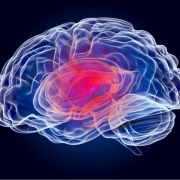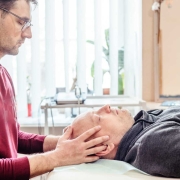Concussion: Signs, Symptoms, and What To Do
Sports-related concussions (SRC) are a growing public health concern. According to the Centers for Disease Control and Prevention (CDC), 1.5 million Americans suffer from a Traumatic Brain Injury (TBI) each year, and three-quarters of these are classified as concussions or “mild” head injury. But the side-effects of a concussion can be anything but mild. A single incident can result in weeks of recovery, missed obligations, lingering headaches and even migraine, brain fog, and dizziness. The cumulative effect of multiple concussions is even more profound and can lead to an increased risk of neurodegenerative health problems later in life.
While getting back in the game and “shaking it off” may be appropriate in certain situations, anyone who suffers a blow to the head during practice or a game should immediately stop playing, particularly young, active children whose brains are not yet fully developed and therefore more susceptible to injury. Downplaying the incident or ignoring it, particularly in the minutes just after it occurs, could result in longer recovery as this study in Pediatrics concluded: “SRC recovery time may be reduced if athletes are removed from participation. Immediate removal from play is the first step in mitigating prolonged SRC recovery . . . “
Dr. Bennet Omalu’s research on professional football players and chronic traumatic encephalopathy (CTE) brain degeneration was highlighted in the major motion picture Concussion and helped put this conversation into mainstream media. Now, communities and organizations around the country, drawing on the research of Dr. Omalu and others, are working diligently to increase concussion awareness among coaches, players, and parents, and to develop protocols for dealing with sports injuries.
Most of those who suffer a concussion do make a complete recovery. But knowing what to do when a head injury happens is as important as knowing CPR.
Symptoms of Concussion
Despite what you see in movies and on television, loss of consciousness typically does not occur with a concussion. Furthermore, the onset of symptoms can be delayed for hours or even days after a head injury, so stay alert for any new symptoms or behavioral changes during this post-injury period. Symptoms can include:
- Temporary amnesia of the injurious event
- Decreased concentration or “brain fog”
- Difficulty learning new material
- Headache or blurred vision
- Sensitivity to noise or light
- Emotional lability (involuntary laughing or crying)
- Anxiety or depressed mood
- Fatigue
- Sleep dysfunction
- Dizziness or imbalance
- Nausea or vomiting
- Physical weakness
- Slurred speech
5 DANGER SIGNS
Seek immediate medical attention for anyone exhibiting any of the following symptoms:
- A change in consciousness, manifesting as difficulty staying awake or alert, not making sense when talking, or not being able to understand what is being said
- Progressively worsening headache
- An increase in nausea or vomiting
- Pronounced physical weakness
- Slurred speech
If none of the five big danger signs above are present, then it is ok to treat symptoms at home, following some basic guidelines:
- Plan a slow return to activity. The brain needs adequate time to heal; however, current research suggests that when it comes to SRCs, too much rest following a concussion may prolong the recurrence of symptoms. It’s important to talk to a physician about the best time to return to activity though a 24-48 hour period of rest is usually recommended.
- Develop a regular sleep cycle. 8-9 hours per night at roughly the same time each day will benefit the brain and promote healing.
- Stay hydrated.
- Avoid watching TV or spending too much time in front of a computer screen. Although it may be difficult to abstain from on-screen entertainment, watching television and playing on the computer strains the brain. Resting quietly is the best way to allow the brain to heal.
- Be patient. If symptoms return after beginning an activity, it’s important to stop and take more time to rest.
It is important to communicate with a physician throughout the recovery process, especially if symptoms aren’t improving, or recovery is slow. In addition to physical symptoms, an untreated concussion can cause changes to brain structure that result in cognitive difficulties, personality changes, and altered emotional functioning.
Supplemental Medical Therapies to Support Recovery from a Brain Injury
- Arnica is a homeopathic remedy that reduces inflammation and swelling from an acute injury; available either topically or in pill form.
- Glutathione, when taken intravenously, helps to decrease the free radicals that can build up after a brain injury. Free radicals destroy neural synapses and lead to cell death that can cause brain damage.
- Omega-3 is proven to improve brain function and may help reduce the neural inflammation caused by a concussion.
- Physical Therapy can be an important part of a person’s concussion recovery. “Brain Gym,” also known as “physical therapy for your brain,” can help those who have suffered a brain injury regain brain-related functions such as memory, vision, speech, emotional balance, physical coordination, learning, and expression. Craniosacral Therapy is a very gentle form of manual manipulation that releases physical imbalances and restrictions as well as residual emotional trauma that has been stored in the body’s membranes and connective tissue. It frees the central nervous system to perform optimally, strengthening immune function, and providing pain relief.
- Specialized Blood Testing – this can be useful if recovery from a concussion is slow or incomplete. This testing can identify genetic markers that indicate the propensity for developing chronic inflammation. When the markers exist, steps can be taken to proactively reduce inflammation so the body and brain can heal more efficiently.
Be realistic about the course of recovery. In the case of concussion or severe TBI, the course of recovery generally follows the same pattern: an initial period of impaired brain function, a period of improvement, and a period where the mental functioning stabilizes without significant additional deterioration or improvement. All of these stages can last hours, days or months, or the case of severe injury, years. Other factors affecting the extent and speed of recovery include the resiliency of the injured brain (especially if there is a history of concussion), the subsequent recurrence of brain injuries or sickness, and lifestyle choices such as getting sufficient rest, nutrition, exercise, and mental activity.
The best medicine is always prevention, but when a head injury does occur, a prompt diagnosis and appropriate treatment are essential to minimizing or avoiding serious health consequences.
Give the brain time to heal. The two-pound tissue between our ears is worth protecting!









Leave a Reply
Want to join the discussion?Feel free to contribute!